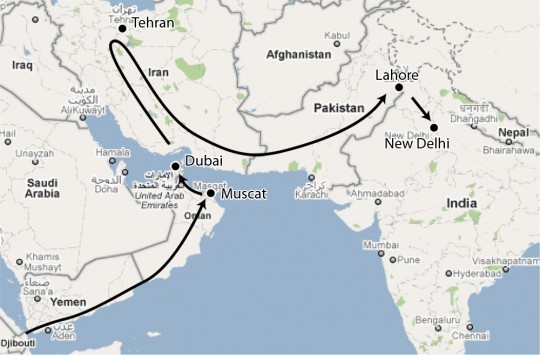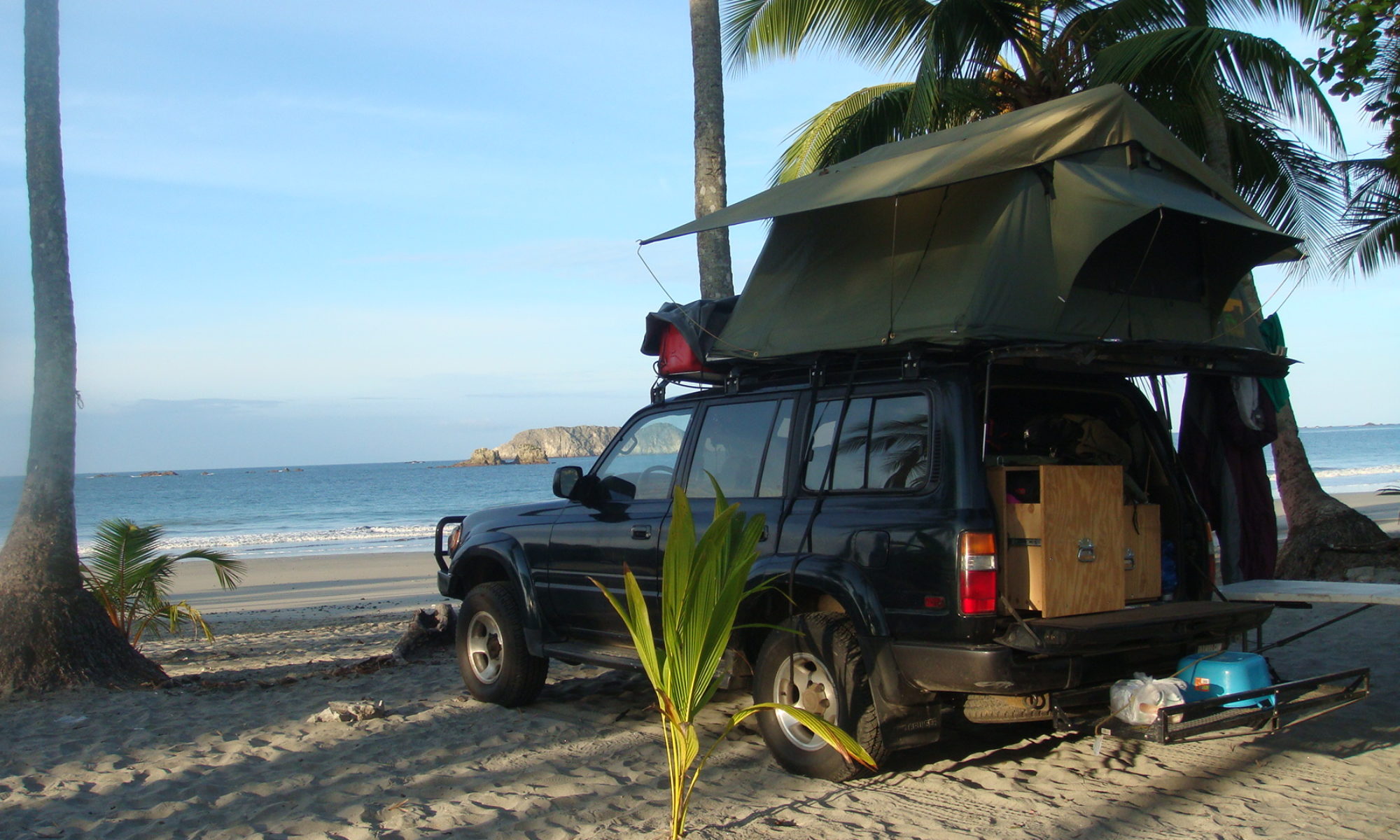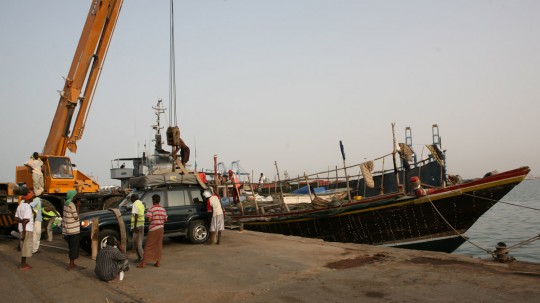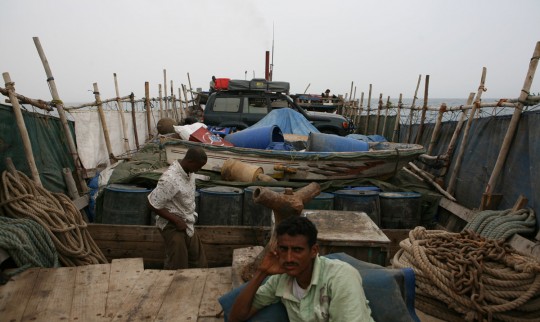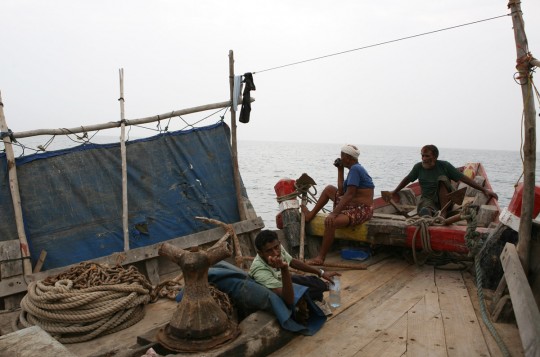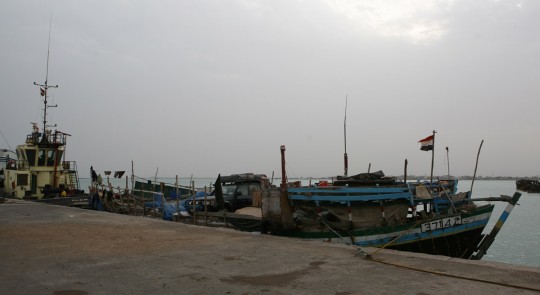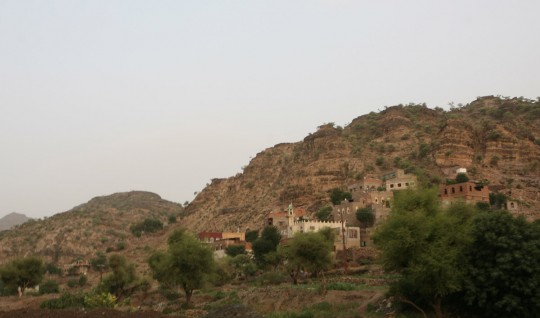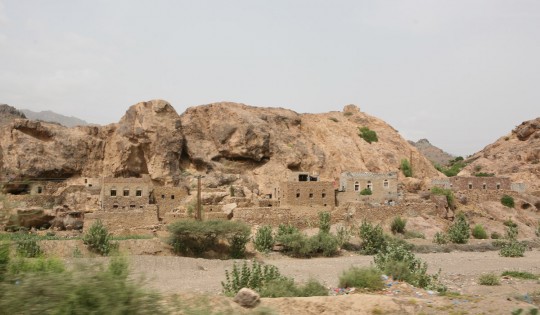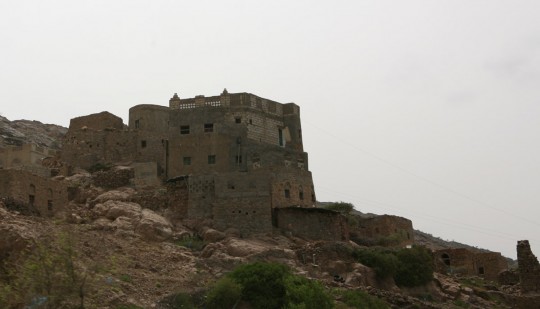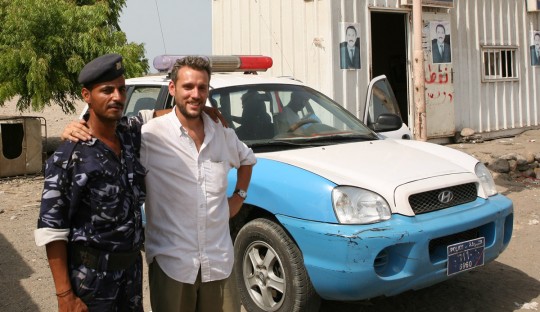
It was like crossing the desert as a storm. On the morning of July 12th, I left Aden to go East, in the direction of Oman. The road between Aden and Mukalla is closed to foreigners, but I decide to take my chance and drive it. Shortly after leaving the city, I am stopped at a military checkpoint, and sent back to the city. There, I find the military headquarter and by chance, I am given a “laissez-passer” that authorizes me to drive the 600 km (375 mi.) stretch of road to Mukalla.
(NOTE TO TRAVELLER: You can try to get the authorization from the “Security” building, opposite to the Aden Hotel.)
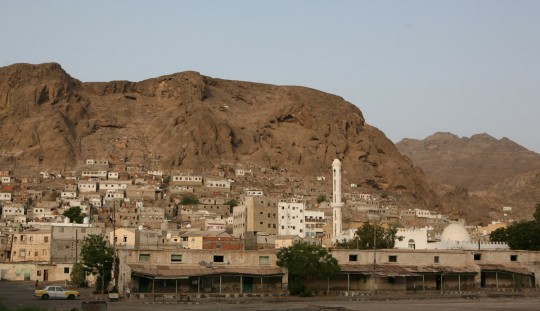
The paper is written in Arabic, and I am not sure what it says, but an hour later, when I am back at the military checkpoint, I am given a military escort of three people with machine guns in a vehicle.
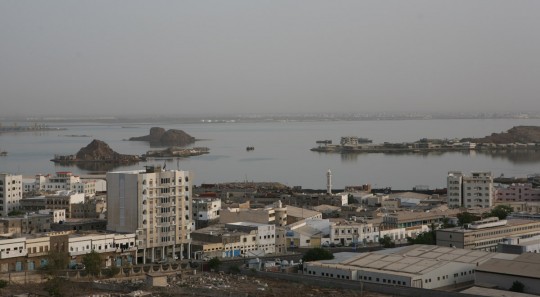
There will be many other checkpoints, and each time, I pick up a new escort, as the previous one goes back home. They drive fast, and I have to follow. It is unclear if they roll at high speed because of danger or just because they want to go back home fast. It is a stressful situation also, since each time I got a new escort they try to get some money from me. And each time, I say the same story. I gave all my money to the previous escort and don’t have a penny left.
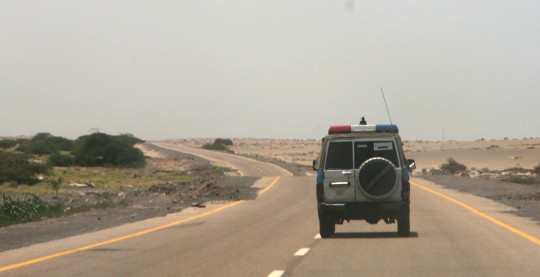
After twenty minutes of discussion, they are furious and we go back on the road.
At the beginning of the afternoon, we stop for lunch in a police station where I am invited to share the meal, a pile of bones a dozen of person fight for on the soil of the yard. I will pass on this one.
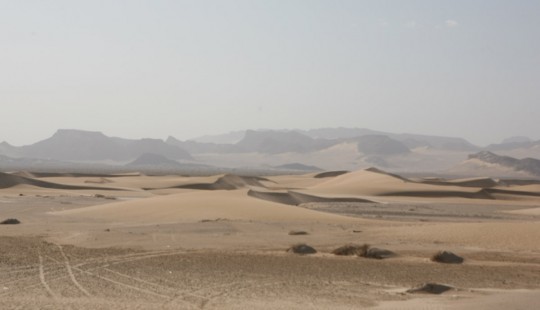
We cross some villages where I am happy to not be alone. Most problems happen in the remote smaller towns. There were recent cases of kidnapping by locals in an attempt to get money or jobs from the government, or worst kidnapping by extremists, usually finishing in bloodbath.
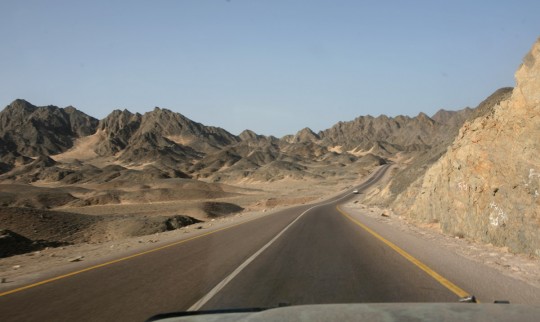
By 6 p.m., the escort let me at the gates of Mukalla, a charming town on the Arabian Sea.
I can finally relax, and take a room at the Half Moon Hotel, on the river that divides the city. I can tell the police always know where I am, since I overhear the hotel manager speaking on the phone about me.
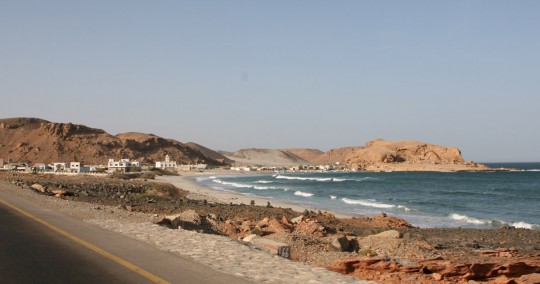
Later in the evening, I go to the police station to try to get another authorization to go to the border, another 600 km (375 mi.) from the city.
I thought I saw the best office setup while I was in the Moka port, where in a small office, customs officers were just sitting on the ground, chewing qat, in front of their desks. No chairs whatsoever. But at the police station in Mukalla, the inspector decided to just bring a bed to work, and set it up in front of his desk. And it is here that he receives me, and assures me that a fresh escort will come pick me up at my hotel at 7:30 a.m. the following morning. Given the setup, I have my doubt anything remotely close to that will happen. And of course, the day after, at 9 a.m., I am still waiting for the Yemeni Starsky and Hutch to show up.
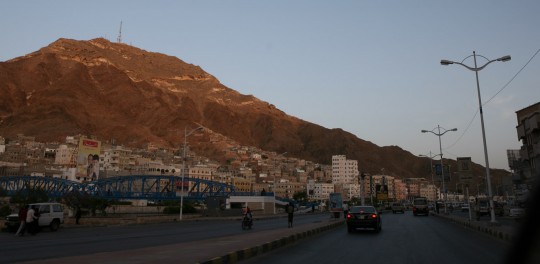
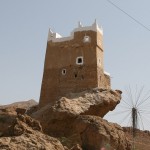
The hotel manager speaks all the time with the police, and asks me to go back to the headquarters. It looks like they have trouble putting an escort together this morning. And there, they finally decide that I don’t need an escort to go east, which I am happy with, given the burden of the high-speed pursuit through the desert. And not having the police on my back with money request will be nice as well.
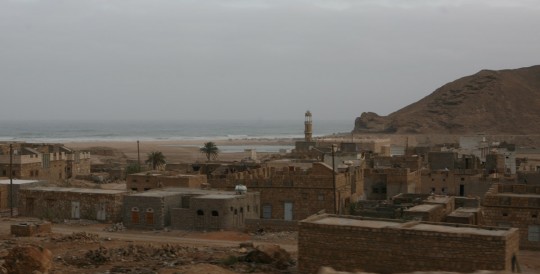
The last stretch of road is truly amazing, one of the best road I saw so far. By some kind of miracle, after I pass Al Ghaydah, the temperature drops. The road is now kind of small, and after following the coast, I enter the mountains. The sun disappears, and a heavy fog rises, forcing me to do the last 30 kilometers to the border at 15 km/h (10 mph).
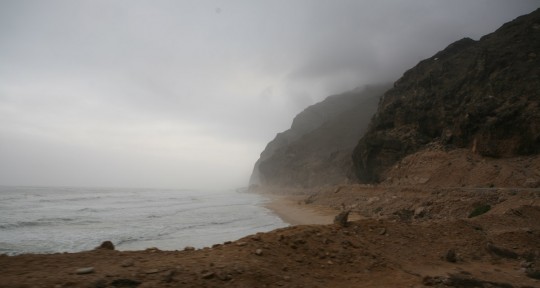
On the Yemeni side of the border, I get some paperwork done with an officer who adopted as well the bed-desk configuration. After that, still in the fog, I go on the Omani side, where I spend a very long time trying to get my visa.
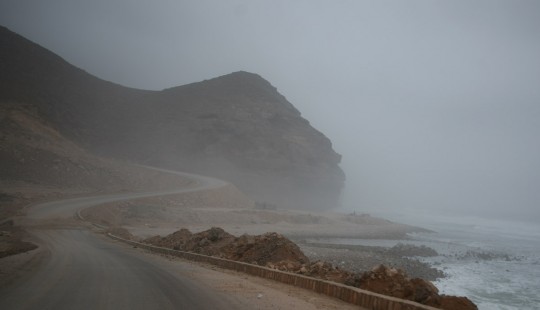
For some reasons, they think my passport is counterfeit, and the verifications will take three hours. They also go through my luggage in what turns out to be the most meticulous search I went through. As a matter of fact, nobody really looked at my stuff since I left the U.S. Customs officers usually realize quickly I am just a tourist-bum leaving in my car and let me go. But this time, it is a big deal. When it is done, they also ask me to go pay the required car insurance, which cost US$83 for 15 days. It will be my first time driving with insurance since Argentina. I also have to pay US$ 20 for the visa.
It is now midnight, and with the fog and darkness, I decide to camp on a parking lot right after the border crossing.
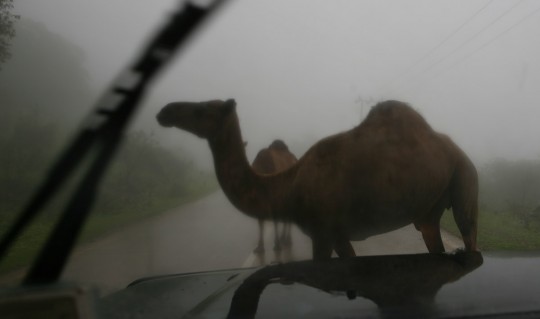
In the morning, it’s raining and still foggy, and I start to go down the mountain toward Salalah. I arrive at destination few hours later, and run some errands in the city. I am back in civilization here in Oman, and see signs that there is a lot of petrol money around. Shopping centers are well stocked, and I wish I could buy more food, but my secondary battery, the one that runs the fridge, went dead as well. Too much heat, too many bad roads made it leak, and the expensive deep-cell battery bought before my departure is now useless. I plan to get a new one in Muscat or Dubai.
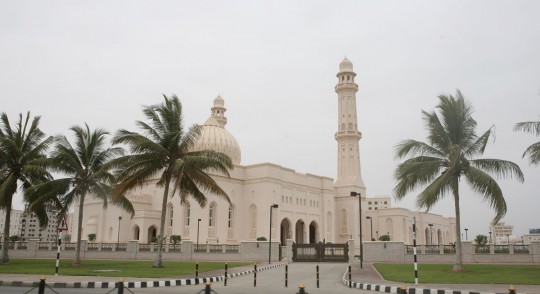
I find a spot on the beach, and set up camp at the end of the afternoon. It is great to enjoy the tempered climate.
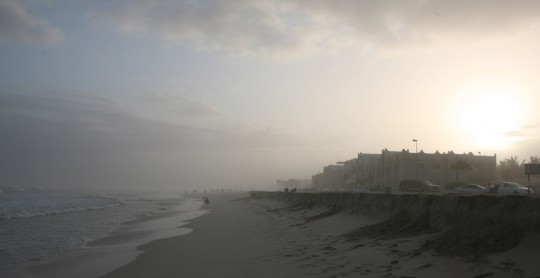
In the next days, I have 1,100 km (690 mi.) of desert crossing to Muscat, so I am trying to cool down here. I didn’t camp in a while too, so it is nice to be back in the tent. The sea is cold and dangerous at this period of the year, so no baths are possible.
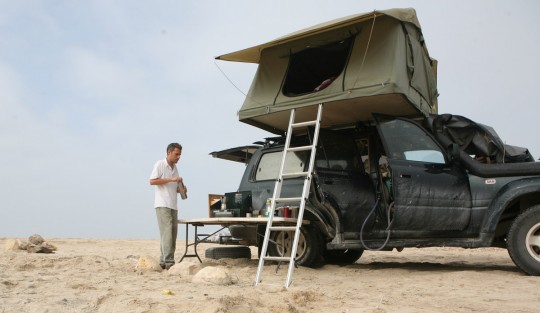
In the morning, I go back to buy food for the day, and go northeast toward Muscat. The roads are very good, and gas cheap, so I plan to be in Muscat in 48 hours, and drive 100 km/h (65 mph) toward destination.
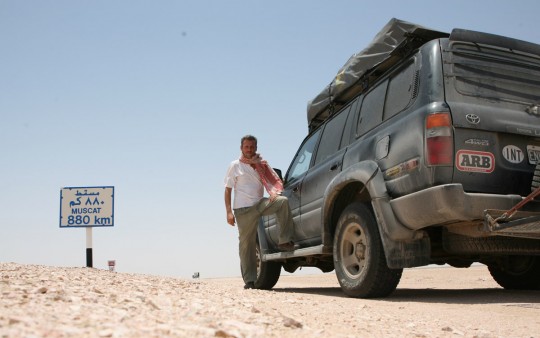
The road goes close to the Saudia Arabia border and its “Empty Quarter”, one of the biggest desert in the world, where summer temperatures can reach 55 deg. Celcius (131 deg. Farenheit). It is also a very oil rich area.
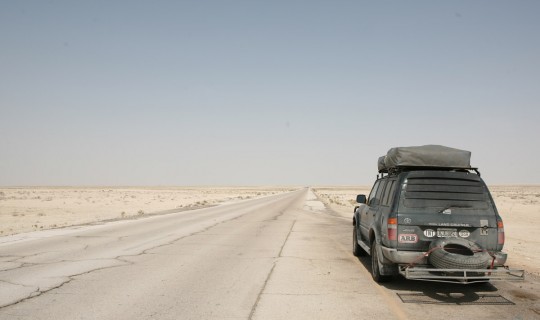
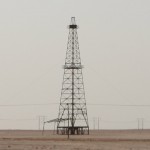
I camp in the desert during the night. The temperature doesn’t go down much. I plan to be the following day in Muscat, where I will spend few days visiting the city and doing the necessary paperwork for the next steps of my trip. The plan now will be to go to Dubai, where I would catch a ferry boat to Iran. From there, I will cross Pakistan and reach India. A lot of visas to get, which will be my homework while in Oman.
